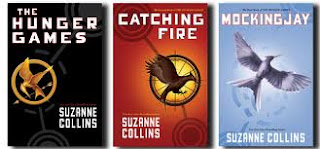The Hunger Games Trilogy—Suzanne Collins

But a shift has occurred since I stepped up to take Prim's place, and now it seems I have become someone precious. At first one, then another, then almost every member of the crowd touches the three middle fingers of their left hand to their lips and holds it out to me. It is an old and rarely used gesture of our district, occasionally seen at funerals. It means thanks, it means admiration, it means good-bye to someone you love. (The Hunger Games, 24)
I have to say, I was reluctant to read these books. I was encouraged by practically everyone I knew to read them, which is exactly what happened with Twilight as well. Even more discouraging - a quote from Stephenie Meyer (author of Twilight) on the back of the first book. This, directly under a rather more eloquent quote from Stephen King. Let me clarify my feelings about Twilight. I'm not a fan. I read them, honestly, because Jon Stewart mentioned them one night on his show, and they sounded interesting at the very least. For me, that is the very least they were. For the most part, they were poorly written, ill informed, and predictable, with mind-numbingly simple characters. There's a quote, funnily enough from Stephen King, that sums it up by comparing Twilight to the Harry Potter series: "Harry Potter is all about confronting fears, facing inner strength, and doing what is right in the face of adversity. Twilight is about how important it is to have a boyfriend." Regardless, enough about my loathing of all things Twilight.
I'm glad I didn't listen to that little voice inside me that wanted to rebel against everyone telling me to read them. I sped through them, reading ravenously until I was finished. My biggest takeaway from the series: if there is a book (or set of books) that you can talk about with your fellow reader friends, which opens up a dialogue about real issues - issues beyond "vampire versus werewolf" - a book that causes you to ponder what you would do in such a situation, it's a book to be treasured.
If you haven't heard the general synopsis of at least the first book, you're probably living under a rock, especially with the film set to come out in March.
In the ruins of a place once known as North America lies the nation of Panem, a shining Capitol surrounded by twelve outlying districts. The Capitol is harsh and cruel and keeps the districts in line by forcing them all to send one boy and one girl between the ages of twelve and eighteen to participate in the annual Hunger Games, a fight to the death on live TV. Sixteen-year-old Katniss Everdeen regards it as a death sentence when she steps forward to take her sister's place in the Games. But Katniss has been close to dead before - and survival, for her, is second nature. Without really meaning to, she becomes a contender. But if she is to win, she will have to start making choices that weigh survival against humanity and life against love. (Back cover description)One thing I appreciate about this series, and appreciated about the Harry Potter series, is that the author is completely unapologetic about killing people off. Fair warning, this means that you should not get too attached to any of the characters. It also allows for quite a bit of unpredictability. Especially as you get into the end of the first book and basically the entirety of the second, I had no idea of the twists and turns that were coming.
Collins creates engaging, realistic, complex characters who cause you to think deeper about the underlying facets of the Hunger Games, and what they might imply about the state of humanity. Can those involved in the Hunger Games truly be said to retain their humanity if it means killing off other human beings for sport, or even for the purpose of survival?
All in all, I would strongly suggest these books to anyone. They are quick reads, particularly because you will get sucked into them and have to finish them. But if you're like me, you'll struggle to start the last one, because you know it means the end.


Comments
Post a Comment